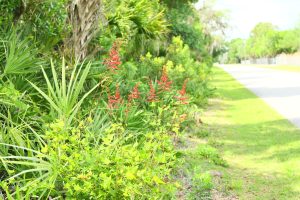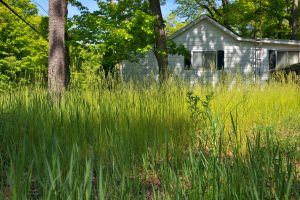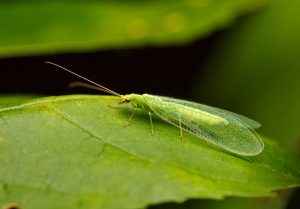When you hear “Florida-Friendly Landscape” what do you picture? Is it a well-kept design that fits in with the rest of the neighborhood or a wild and untamed eye-sore? Do you see an abundance of flowers and wildlife or a lot of weeds and vines? Lately I’ve heard a lot of buzz from people who have the wrong impression about Florida-Friendly Landscaping™ so here I’m going to dispel the top 3 myths.

Photo credit: Inga
Myth 1- You must use all native plants.
While it’s true native plants play a vital role in every landscape ecosystem, a Florida-Friendly Landscape (FFL) isn’t limited to just native plants. Incorporating natives in your landscape is important, especially in areas along the water such as retention ponds, lakes, creeks, rivers and the ocean. Equally as important is avoiding prohibited and invasive plants, matching the right plant with the right growing conditions, and knowing the mature sizes and characteristics of the plants used. The “Florida-Friendly Landscaping™ Guide to Plant Selection and Landscape Design” takes the guesswork out of choosing plants. It provides plenty of options of native and non-invasive plants that are adapted to N FL, and it’s even available as an app so you can check plants on the go right from the store! Find it here.

Myth 2- They look overgrown.
Some people believe the best way to be Florida-Friendly is to let what grows grow, mow infrequently (if at all), and just let nature take care of itself. While that sounds like an environmentally responsible decision, there is more to it than that. A FFL must contain defined planting beds that are maintained to remain aesthetically pleasing as well as to monitor and control invasive and prohibited plants. Additionally, working towards a FFL isn’t a ticket to bypass your HOA or local government and do what you want. Most HOA’s and municipalities have covenants and ordinances which apply to all residents, regardless of whether they are using FFL principles or not. Allowing weeds and wildflowers to take over your yard and calling it Florida-Friendly or replacing all the plants in the yard without first consulting your HOA architectural review board could potentially result in penalties or enforcement actions.
Myth 3- You can’t or shouldn’t use any fertilizer or pesticide.

It isn’t an all-or-nothing thing. Some circumstances may require fertilizer or pesticides to maintain good plant health. FFL principles encourage homeowners to fertilize appropriately and to identify any pests and use the least toxic method of pest control first. Some plants such as palms need fertilizer to grow optimally and without nutrient deficiencies. If a soil test indicates a nutrient deficiency in a yard, lightly applying slow-release fertilizer (NOT a weed ‘n feed product) to turfgrass during its growing season is acceptable. Handling fertilizer and pesticides responsibly are important principles.

Knowing exactly what, when, and how much to apply is crucial to avoid damaging plants, encouraging pests, and polluting the environment with excess. Spot treating vs broadcast application of pesticides is recommended. When in doubt, reach out to the Duval County Extension Office at 904-255-7450 for help with all things fertilizer and pesticide related.
Simply put, Florida-Friendly Landscapes are attractive landscapes that protect our natural resources by conserving water, reducing pollution, and creating wildlife habitat.

Achieving a FFL is something everyone is capable of whether they live in a suburban HOA, a cottage the beach, or out in the country. It’s especially easy to achieve when planning a landscape in new construction. The slightly higher cost up front will save a homeowner a lot of time and money in the long term. To learn more about the Florida-Friendly Landscaping™ Program and how you can help protect and conserve our most precious natural resources please visit the FFL Homepage or contact the Duval County Extension Office at 904-255-7450.
 7
7
